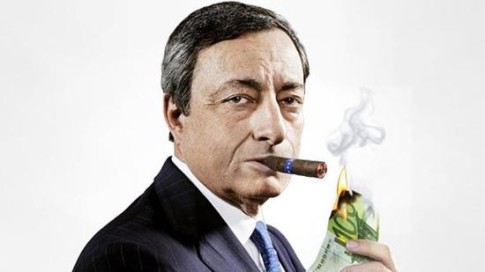– War on Cash Puts ECB, EU on Collision Course with Germany:
Bundesbank: It’s a war on personal freedom and choice.
Relations between Germany, and the ECB have curdled in recent times over a key issue: the role of cash. Germans have a soft spot for physical lucre while the ECB and Europe’s executive branch, the European Commission, have openly expressed their desire to suppress, or even punish, its use.
For Germany’s central bank, the Bundesbank, the war on cash is a war on personal freedom and choice, in the name of saving a financial system and its absurd negative interest rates. Last year Bundesbank president Jens Weidmann warned that it would be “disastrous” if people started to believe cash would be abolished — an oblique reference to the risk of negative interest rates and the escalating war on cash triggering a run on cash.
In Germany, trust in Europe’s financial institutions is already at a historic low, with only one in three Germans saying they have confidence in the ECB. That was before ECB president Mario Draghi gave an infamous speech in May last year laying much of the blame for the Eurozone’s weak economy on Germans’ proclivity to save, rather than splash out on foreign imports or invest in the stock market.
Now, it’s the turn of the scientific advisory board of the Federal Ministry of Economics and Technology to have its say. In a new report, the board, which includes former ECB Chief Economist Otmar Issing, cautions that any attempt by government or central banks to enforce mandatory controls or withdraw larger denomination bills, as the ECB has pledged to do next year starting with the €500, could have very negative repercussions, in particular for the general public.
“Upper cash limits will hurt ordinary citizens, while the shadow economy and organized crime are likely to escape monitoring and alternative methods of payment,” it warns. The report highlights a number of potential negative consequences of suppressing or outlawing cash:
- The potential for abuse or misuse of personal data: “The anonymity of payments (offered by cash) protects against misuse of… information.”
- Less control over personal finance: “Whoever makes a payment in cash can see immediately how many coins and notes they have left in their purse or wallet.” This is much harder in a purely digital economy.
- A threat to personal freedom and anonymity: The report also describes the potential “interference” in the freedom of ordinary citizens as “disproportionate.”
The European Commission would beg to disagree. It recently stated its intention to “explore the relevance of potential upper limits to cash payments”, with a view to implementing cross-regional measures in 2018. In the small-print accompanying the draft legislation, it breezily points out that privacy and anonymity do not constitute “fundamental” human rights:
…prevent(ing) the anonymity that cash payments allow might be viewed as an infringement of the right to privacy enshrined in Article 7 of the EU Charter of Fundamental Rights. However, as complemented by article 52 of the Charter, limitations may be made subject to the principle of proportionality if they are necessary and genuinely meet objectives of general interest recognized by the Union or the need to protect the rights and freedoms of others.
Any attempt by the European Commission to set a mandatory continent-wide limit was bound to meet fierce resistance, in particular from countries that don’t have cash payment limits like Germany and Austria. The Bundesbank is also one of the world’s biggest manufacturers of physical cash. In total, €592 billion of the €1.1 trillion of banknotes in circulation at the end of 2016 started life at the Bundesbank.
Judging by its recent statements, the Bundesbank is determined to preserve this arrangement. Last year Carl-Ludwig Thiele, Bundesbank board member in charge of cash issues, delivered a barnstorming speech on the folly of suppressing cash in order to prevent people from escaping negative interest rates by fleeing into cash:
“This would, in my view, be the wrong response to the monetary policy challenges at the zero lower bound. Instead of financial repression it would make much more sense to discuss how economies could achieve stronger growth again through higher interest rates.”
The ECB hit back last month by threatening to make Germans pay for their love of physical money. If a national central bank such as the Bundesbank uses more than its allocation of physical cash, it should be made to pay interest on the overuse, at the ECB’s main refinancing rate, sources at the ECB said. For the moment, the issue is moot since the ECB rate is 0%.
But should the ECB, over time, raise benchmark interest rates to, say, 2%, it would result in an annual cost of €6.5 billion on the Bundesbank which would be paid to the national central banks of countries such as Spain and Portugal, who are underusing their cash allocation. In other words, the more physical cash a country’s citizens use, the higher the price for their respective central bank (and vice versa).
This could be a major problem in a country where almost 80% of all retail transactions are paid with cash. Even among millennials, two-thirds prefer paying in cash to electronic means of payment. Overall, the value of cash money used in Germany in 2016 rose by more than 7%.
It is not yet clear who will gain the upper hand in this conflict between Europe’s most powerful institution and Europe’s strongest economy and most powerful nation. But whatever the outcome, it’s likely to have major repercussions far beyond Germany’s borders. By Don Quijones.
The ECB is hatching a new plan, but at its own peril. Read… Are Germans About to Be Made to Pay for Their Love of Cash?
H/t reader squodgy:
“Good, now the German people are showing signs of mistrust in the Draghi dogma.”
* * *
PayPal: Donate in USD
PayPal: Donate in EUR
PayPal: Donate in GBP
